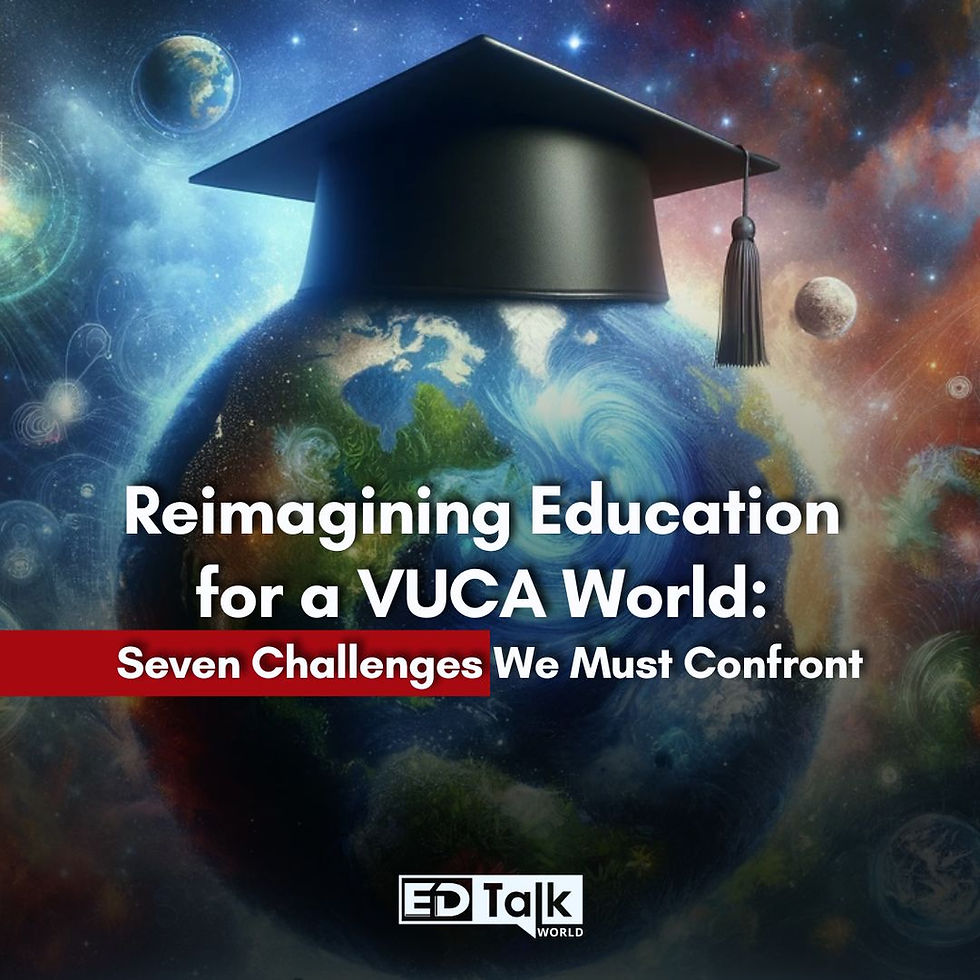Reimagining Education for a VUCA World: Seven Challenges We Must Confront
- EdTalk World

- Nov 18, 2024
- 2 min read

The world we live in today is radically different from the one our great-grandparents knew. With a global population nearing eight billion, exponential advancements in technology, the pervasive impact of social media, and growing environmental crises, we are living through a paradigm shift that is reshaping nearly every aspect of our lives.
1. Mindfulness: Managing Stress in a Hyperconnected World
In many parts of the world, especially in "developed" countries, young people are increasingly burdened by stress, anxiety, and the relentless pace of modern life. The rise of mindfulness programs in schools is one response to this, but is it enough? While mindfulness practices like meditation can help students find focus and calm, there are simpler, yet equally effective, ways to cultivate mindfulness.
2. Singularity: The Rise of Artificial Intelligence
As artificial intelligence (AI) continues to evolve, it is reshaping the very definition of intelligence. The key challenge here is to identify those areas where human intelligence will always have the upper hand—creativity, empathy, and ethical decision-making.
3. Terrorism: Education as a Tool for Understanding and Prevention
Terrorism is an ever-present threat in many parts of the world, and it is fuelling a climate of fear and mistrust. The challenge for education systems is to move beyond simply teaching about terrorism to addressing the deeper, often spiritual, causes that drive people toward extremism.
4. Sustainability: A Call for Radical Change
Perhaps the most urgent challenge facing humanity is the depletion of our planet’s resources. With humanity currently consuming more than 150% of the Earth’s biocapacity, we are on a collision course with disaster.
5. Post-Truth Politics: Teaching Critical Thinking
We live in an age where "truth" often seems to be negotiable, and political discourse has become more about persuasion than facts.
6. Knowledge in the 21st Century: Skills vs. Content
With the explosion of accessible information through the internet, some argue that schools should focus less on traditional content and more on developing skills. While skills like problem-solving and adaptability are crucial, knowledge remains foundational. In fact, knowledge in the humanities, literature, and history is more relevant than ever in understanding the complexities of our world.
7. Character: The Foundation of Our Response to Global Challenges
The global crises we face are mostly from climate change to political instability that demands individuals with strong character, resilience, and ethical clarity. Education must not only impart knowledge but also foster the moral and emotional development necessary to confront these challenges with integrity and compassion. In a rapidly changing world, the development of character is as important as academic success.
Conclusion
The world is changing faster than we can imagine, and our educational systems must evolve to meet these challenges head-on. From mindfulness and artificial intelligence to sustainability and the erosion of truth, the questions we face are complex and interconnected. But the opportunity for transformation is just as great. By rethinking education to address these seven challenges, we can prepare young people not just to survive in a volatile world, but to thrive, lead, and make a meaningful difference in the 21st century.
Follow EdTalk World for more news and updates from the education industry.
.png)



Comments